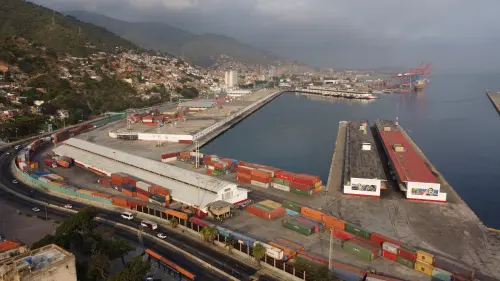U.S. President Donald Trump has issued an executive order establishing a 25% tariff on any country purchasing oil or gas from Venezuela. Meanwhile, his administration has extended the deadline for Chevron to wind down its operations in the South American country.
This new policy alleviates some of the pressure on Chevron, which faced a 30-day deadline from the U.S. Treasury Department earlier this month. Trump previously called for the wind-down due to President Nicolas Maduro's lack of progress on electoral reforms and the return of migrants.
The Treasury announced it would wait until May 27 to terminate a license granted to Chevron in 2022, allowing the company to operate in Venezuela and export oil to the U.S. This extension was announced shortly after Trump emphasized the new tariff, attributing "very violent" behavior to the "tens of thousands" of Venezuelans who have migrated to the U.S.
These measures redirect pressure onto buyers of Venezuelan crude oil outside the U.S., particularly China, although the enforcement of the tariff remains uncertain. David Goldwyn, president of Goldwyn Global Strategies, noted that these actions could be a compromise between those concerned about removing Western companies from Venezuela and those worried about strengthening Maduro's regime.
Imposing tariffs on foreign buyers of Venezuelan oil may impact crude exports, necessitating price discounts similar to the secondary sanctions Trump enforced in 2020. The extended wind-down period for Chevron would ensure payments for oil deliveries to U.S. customers while preventing a drastic decline in exports from Venezuela, especially to the U.S.
Earlier this month, Trump invoked the 1798 Alien Enemies Act to justify the deportation of alleged members of the Venezuelan gang Tren de Aragua without final orders from immigration judges, focusing on illegal migration as a top priority of his administration.
Venezuela's government has firmly rejected what it terms "new aggression" from Trump, asserting that this "arbitrary, illegal, and desperate measure" confirms the failure of all sanctions imposed against the country. The 25% tariff will be effective on April 2 and will be added to any existing tariffs. It will expire one year after the last import of Venezuelan oil.
The tariff applies to countries purchasing Venezuelan oil through third parties. Following Trump's announcement, oil prices rose by 1%, though the increase was tempered by the extension of Chevron's license.
Venezuela relies heavily on oil exports, primarily to China, which is already facing U.S. tariffs. China received about 503,000 barrels per day of Venezuelan crude and fuel, accounting for approximately 55% of total exports. Other consumers of Venezuelan oil include India, Spain, Italy, and Cuba. Tariffs previously imposed by China on certain Venezuelan oil imports led to a decrease in the volume received, ultimately forcing PDVSA to offer wider discounts to its key market.
Rubio indicated that foreign buyers of Venezuelan oil would be informed of the policy change; however, many joint-venture partners of PDVSA continue to take cargoes. PDVSA is also preparing to reorganize operations at its largest joint venture with Chevron, the Petropiar project in the Orinoco Belt, to secure oil exports.
Maduro has condemned U.S. sanctions as illegitimate measures amounting to an "economic war" against Venezuela, though he has praised his government's resilience in the face of these measures. Goldwyn remarked that the new tariffs might ironically bolster global demand for Russian oil, as China and India may opt for Russian crude to avoid additional tariffs associated with Venezuelan heavy oil.
